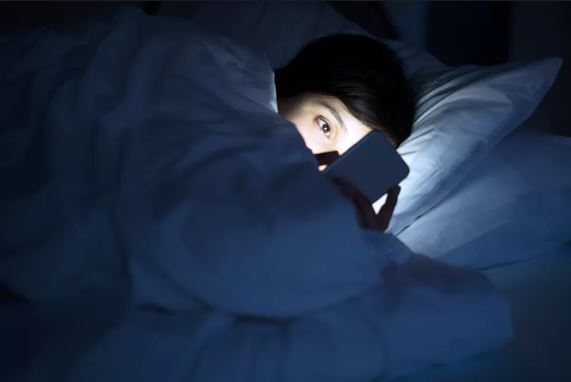6 Natural Sleeping Tips To Beat Insomnia For Good

If you’re anything like me, you don’t take a good night’s sleep for granted. I’m especially envious of those people who fall asleep within seconds of their head hitting the pillow (like my hubby!). It has taken me anywhere from 15 minutes to four or five hours to fall asleep, depending on the night. And of course, there were those nights where my body decided it didn’t need any sleep at all. If this has never happened to you, consider yourself lucky.
Stop reading this article and go make yourself a celebratory party because you can sleep like a normal person. But if this has described you at one point or another, you’re probably looking for natural ways to fall asleep more easily – and stay that way until your alarm goes off in the AM.
1. Set A Sleep Schedule

Set a sleep schedule.
Yes, I know you have to wake up for work at 7:30 every day and you just want to sleep until 10:30 on the weekends (or later). But your body needs a set schedule. Let’s say you train your body that it must go to sleep at 10 pm every night and wake up at 7:30 am.
Just as it is getting used to that schedule, you crawl into bed at 12:30 am Friday night and sleep in until 10:30, so your body starts adapting to this new schedule – but then on Sunday night, you expect it to fall asleep again at 10 pm. It’s just not going to happen. You wouldn’t function well either if I kept changing around your routine every half a week – so don’t do the same thing to your body, if you want to be sleeping well.
2. Exercise Healthily

Regular exercise is key.
Exercise is not just good for your general health, it also does wonders for your sleep. A daily aerobics class, jog or even a brisk walk can help improve not only how long you sleep for, but the quality of your slumber as well. But you know how after a good run, you feel invigorated and on a high?
You don’t want that to happen when you’re trying to fall asleep. Make sure that your exercise routine is at least four hours before your planned bedtime, to give your body enough time to wind down.
3. Cut Out The Caffeine
Most of us rely on our daily morning cuppa – especially if you didn’t get enough sleep the night prior. However, after after 2 p.m. or earlier, you need to skip the urge to eat or drink anything containing caffeine.
Since it stays in your body for up to eight hours – which is great news when you have that coffee before work, but not so great when you have one with dinner – make sure to cut out caffeine (that includes chocolate!) within 8 hours of bedtime.
4. Keep It Black

Dark bedroom.
No, I’m not still talking about your coffee – I’m talking about your sleep environment. You’ve probably heard that you should limit screen time at least an hour before bed, as it interrupts your body’s sleep hormone (melatonin).
But you might not know that even a tiny bit of light, such as the time display on your phone, can also be affecting your sleep. Not to mention those random midnight texts or tweets that light up the screen. Keep your phone in the kitchen and buy yourself one of those old-fashioned alarm clocks. You’ll be surprised at the difference it makes.
5. Use A Diffuser

Use a diffuser.
Your sleep environment is just as important as your daily routine. If you suffer from insomnia, you might find yourself stressing out in bed about how you’re going to fall asleep, and what time it will be if and when you do fall asleep… and the stress just keeps you awake even more (talking from experience here).
You need to take measures to relax your mind and take away the anxiety. Place a diffuser in your bedroom, add water to the fill line, and then add in 5-7 drops of a calming oil, such as lavender essential oil or ylang ylang essential oil. Both of these oils work to relax your mind, ease tension and generally help you fall asleep more easily and stay asleep throughout the night.
6. Temperature Is The Key

Adjusting thermostat.
When you’re sweating or shivering, it can be really hard to fall asleep – even for those lucky people who usually fall asleep in seconds. The right temperature for a bedroom should be between 65 and 72 degrees Fahrenheit – you’re not in the sauna or the swimming pool right now. When you are under the covers, think Goldilocks. Not too hot, not too cold, but just right.
Conclusion
Growing up, my grandmother had a hard time falling asleep (I guess it must be genetic) and she took sleeping pills to help her fall asleep. Eventually, she became addicted to them to the point that she physically couldn’t fall asleep without them, so I’ve always been wary of taking any sleeping pill (including melatonin) for fear that I would come to rely on it.
That being said, I’m always interested in hearing about natural ways to help sleep come easily, without having to take any kind of medication. Surprisingly, a lot of these tips are lifestyle changes rather than “quick fixes”. But in the long run, you’ll be leading a healthier and more successful life – and bedtime will be a cause for relaxation rather than stress.
If you’re truly an insomniac, you’ll agree with me. Changes that might be hard at first but will result in regular, quality sleep? One hundred percent, absolutely, definitely worth it.

